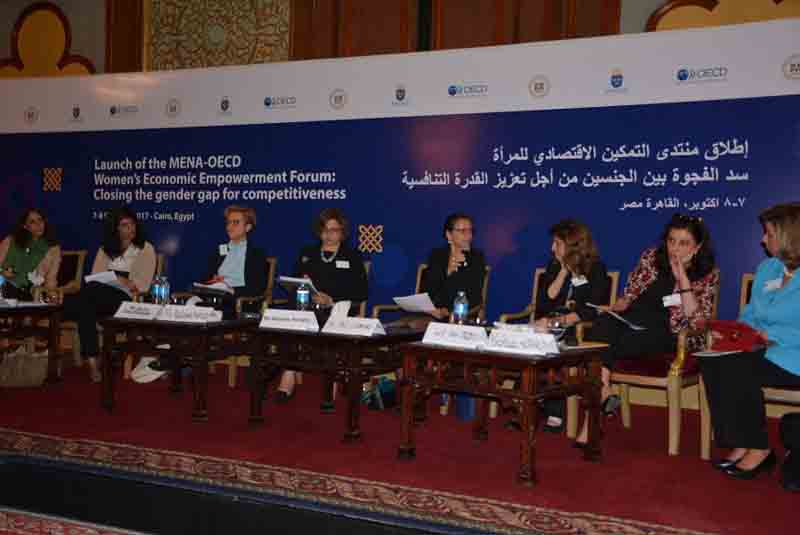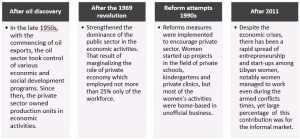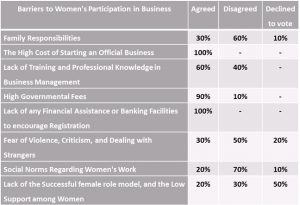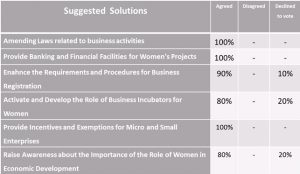By: Jusoor Centre for Studies and Development.

Tripoli, 10 October 2017:
On October 8th and 9th 2017, the Egyptian capital hosted the launch of the Women’s Economic Empowerment Forum (WEEF) by MENA-OECD Competitiveness Programme which aims at increasing women’s economic potential and participation to build more inclusive and prosperous societies. The launch event brought together high-level policy makers and representatives from business, academia and civil society in the MENA region to exchange experiences and advance concrete actions for policy reform.
The Co-Founder of Jusoor Centre for Studies and Development (Jusoor), Ekram El-Huni, was invited to participate as a speaker on the panel of discussion to give insights on the status of Libyan women and the informal market. Jusoor’s intervention was based on a research paper they published in April 2017. The paper ‘Building an Inclusive Economy in Libya.’ was part of a larger campaign that focused on the inclusion of women in the Libyan formal economy. The research paper took a look at the specificities of Libyan women’s participation in the informal economy through 1. Review of secondary data and 2. Focus Group Discussions carried out with female business owners in Tripoli, Benghazi, Yefren, and Sebha.
According to the IMF – estimates of the size of the informal economy range from 35-44% of GDP in developing countries, to 21-30% in countries in economic transition, and 14-16% in OECD countries. In the case of Libya, 2.6% of the GDP of non-oil commercial activities in the early 1980s, 4.8% in 1989, 8.3% in 1999, but then this decreased to 3.1% in 2006. After 2006, there was a struggle to obtain reliable data on the informal economy with some sources highlighting it would likely have reached 40% by now, particularly considering the effects of war and civil conflict on the shadow economy.
The other issue for Libya is that its private sector development has been hampered during the past decades as shown below:
In terms of women’s contribution to the economy, it’s known that the issues mentioned in the previous section definitely affected their contribution to the economy. The reform measure of the 1990s helped women participate more actively in the private sector (mainly in private schools). However, most of the activities highlighted were home-based and unofficial – including work in fashion design (sewing, tailoring), catering and event management, personal importation of fashion goods for sale (clothes, shoes and beauty products), salons and bakeries/pastry shops.
After 2011, women’s initiatives grew but they remained small in scale and basically informal micro-businesses. While they contribute quite extensively in reducing poverty, and create local and national economic development during this current conflict period, their role is not included in the official economic indicators. Also, women-led projects have a slimmer chance to grow and expand, although they have a considerable market share of the shadow economy and the potential to create jobs and support other businesses in their supply chains.
During the discussions with female business owners in Tripoli, Benghazi, Yefren, and Sebha, it was found that the main impediments for Libyan women working in Libya:
When they were asked about the potential solutions they provided the following suggestions themed around (1) legislation, (2) access to financing and (3) technical support to small and medium enterprises (SMEs):
The report has concluded that the social and cultural factors are not the primary reasons that hinders women inclusion in the economic activities but rather the business ecosystem that needs a serious reform to foster stability and long-term growth for small and medium business with the following broad recommendations that will encourage Libyan women to join the formal economy:
There is no doubt that women in Libya have an important role to play in post-revolutionary and during the times of armed conflicts, even though their role is difficult to measure due to the lack of official government statistics or any other reliable sources of data on the participation rates of women and men in the labour force and commercial activities. Jusoor Center is fully committed to continue in advancing women as key partners in the economic development process in different fields including agriculture, industry and services.
The above was a summary of the contribution of Jusoor at the OECD-MENA Women’s Economic Empowerment Forum (WEEF) held in Cairo. Jusoor is a Libyan NGO committed to independent policy research on human development projects for women with focus on economic and social empowerment.














